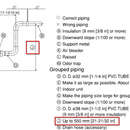Mitsubishi minisplit: condensate drain
I recently had an HVAC contractor install several ducted Mitsubishi minisplit units in our home (SEZ-KD09 & SEZ-KD12). The contractor did all of the work with the exception the condensate drains. He suggested I complete this piece myself as it is relatively simple & straightforward.
I have a pretty basic question. One of the units is in a crawlspace beneath our living room. Getting the drain out of the crawlspace either requires a ~12″ vertical jog or I need to bore through concrete. I’m not sure if these units have a condensate pump and I’m not sure if having the drain piped vertically for 12″ will cause a drainage problem.
In reviewing the installation manual, I think the condensate drain can be routed vertically up to 550 mm (see attached). I’m hoping for validation on this as boring a 2″ hole through concrete is not something I really want to do.
Thank you,
Brian









Replies
Brian,
You don't tell us whether you are planning to install the indoor unit or the outdoor unit in your crawl space. It's probably the indoor unit, but you never know.
It's highly unusual (and unnecessary) to install the indoor unit of a ductless minisplit in a crawl space. If your crawl space is so hot, or so cold, or so humid, that it needs a minisplit head, something is seriously wrong with your crawl space.
Second: Here's the principle with condensate drains. A condensate drain can't have an uphill leg unless your unit has a condensate pump (usually an optional accessory). Absent the pump, the condensate drain line can't go uphill; it has to slope continuously downward.
Martin,
Brian states it is a ducted system, so i think the crawlspace is being used to access different parts of the main living space. Maybe Brian can give us more detail on his crawlspace. Is it vented or sealed, for example?
I watched a couple of videos on installing a Mitsubishi condensate pump. It looks like a simple job.
Steve,
Thanks for your correction. Clearly, I read the question too quickly. If it's ducted, that explains why it might be installed in a crawl space.
经济特区的单位有一个微型泵(又名“冷凝ft mechanism") built in. I've never installed an SEZ personally, but they did talk about them at a Mitsubishi training I attended. I was told that it's important not to exceed either the vertical or the horizontal runs shown; in the event of a power outage, the water in the line drains back into the drain pan, which can overflow if the lines are too long. If necessary, you can always install an aftermarket condensate pump.
Brian,
Listen to Jon Harrod, not me.
Thanks, Jon.
Thank you all. Sounds like either install a real condensate pump or bore through our concrete wall so the drain line doesn't have to make the 6" vertical jog needed to get out of the crawl space. Boring will be a pain but also less problematic in the long run. I appreciate everyone's feedback.